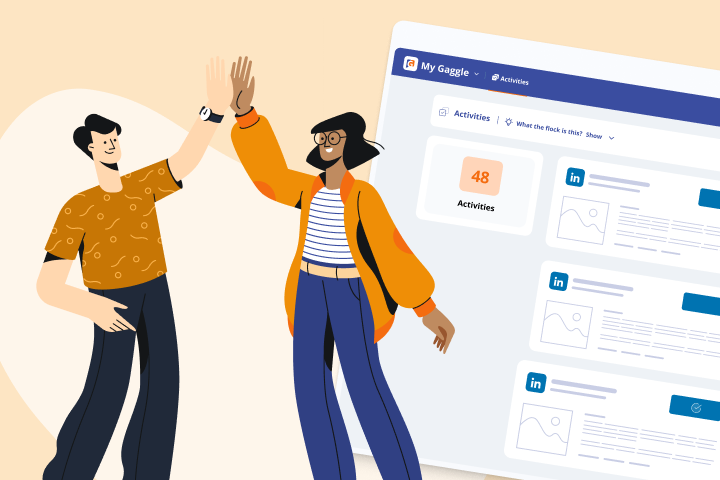Your Employees Aren’t Sharing Marketing Content and Why They Should
Do you consider your employees when formulating your social media strategy?
Your employees are a more valuable resource than you think. Employee social sharing can produce eight times more interaction than content shared by your brand alone, and it can be re-shared as much as 25 times more frequently.
A study conducted in 60 countries found that 83% of consumers trust recommendations from friends and family more than they trust brands. Individuals—even when they are employees—are thought to be more believable than the actual company they work for. Your employees’ reach on social media is as much as 561% higher than your corporate reach and leads developed from employee social media efforts are seven times more likely to convert to clients.
Still not convinced you should be involving your employees in your social media strategy? Consider that Dale Carnegie found that companies with engaged employees outperform those without them, by up to 202%. Employee advocacy programs are a great way to increase employee engagement, as they build on the relationships employees have with their company, and with the company’s clients.
The numbers speak for themselves, but far too many employees still do not talk about their company online, and those who do may not be sharing the message you want. Let us look at the reasons staff (outside of your marketing department) might not be involved in social sharing.
Employees don’t know if they’re allowed to share
The overall economic situation in North America has improved over the past few years, but job anxiety is still a very real thing for employees. While 50% of employees are already talking about their company online, many do not know what they are allowed to say and are scared of getting in trouble with their employer.
The reason for this uncertainty is your social media policy, or better put, your lack of policy. 73% of companies do not have employee social media policies. This is not uncommon, perhaps, since the issue of social media policy often comes to mind only after someone has done something wrong. But writing a social media policy can be easier than you think.
All too often, when a social media policy of any sort is developed, it focuses on what employees cannot say rather than encouraging them in what they can share. This addresses issues of corporate risk and liability, but it tends to create documents that are unreadable and unwelcoming for employees.
Being proactive and developing a social media policy is an excellent way to avoid problems, but it can also be a great way to encourage participation on social channels. If you are looking for inspiration, check out some of the best social media policies from other companies. Notice how these policies are incredibly easy to understand - that’s an intentional decision on the part of their creators. A simple and actionable policy educates and employers your employees on social media, which can help lead to improved employee sharing.
Employees do not know what to share
You spend a great deal of time and effort developing the perfect marketing message for your organization, but your employees do not know what they should share.
The easy solution is to provide them with the messages you want them to use. In an experiment conducted by Jason Burrows, 50 employees (with a total social audience of less than the brand) who were provided content to share, were responsible for 94% of the clicks from social media generated over the test period.
The surprising part of this experiment is that 88% of those clicks were generated by a group of only 25 people. Jason had split the 50 people in his test into two groups – half of them were given content in an Excel spreadsheet and asked to share this info, while the other half received a tool to let them share the content in one click.
In case it was not obvious, the group with the sharing tool had the greatest impact. If you are starting an employee advocacy plan for your organization, ensure that you make the process of social sharing as easy as possible for all of your employees—not just those on your marketing team.
Employees do not know how to share
While social media is a common part of everyday life, not everyone actively uses social media; some people still do not use it at all. 78% of adults in the U.S. have a social profile. This is important to know because although you will need to structure your training to fit this majority, you cannot forget to include the nearly 1 in 4 adults who don’t use social media.
Employees who have received training on social media share more content and get better results from their sharing efforts. Investing the time and money to train everyone to the same standard can pay dividends for your company. Throwing in small perks like professional photographers to take profile photos can help improve the look of employee social media profiles, and it can also increase employee buy-in on the training process.
Employees do not see the value in sharing content
Adding employee advocacy as an element of your social media strategy has obvious benefits for your company, but it might not be so clear to your employees.
The first step to a successful employee advocacy program is establishing a narrative that helps your employees understand the overall goals of your company and how their efforts fit in. This will empower them and allow them to take pride in being a part of a cohesive team. As a side benefit, your employees might even develop their own personal brand—it’s a win-win. Participating in an employee advocacy program offers them benefits in the form of growing their personal brand. Appealing to self-interest is a great way that you can help them see the value of sharing content.
Bringing it all together
While there is no magical solution that will turn your employees into social networking superstars overnight, you can remove the obstacles to sharing by creating a comprehensive foundation for employee advocacy.
A social media sharing tool like GaggleAMP can help employees understand what they can share. It also makes it easy to share (often with just a click), and lets your staff see the immediate impact of their efforts on social media. Creating a framework that makes sharing as easy as possible stacks the deck in your favor for the best possible results.











